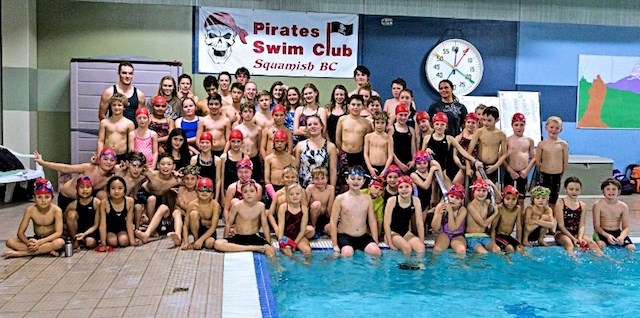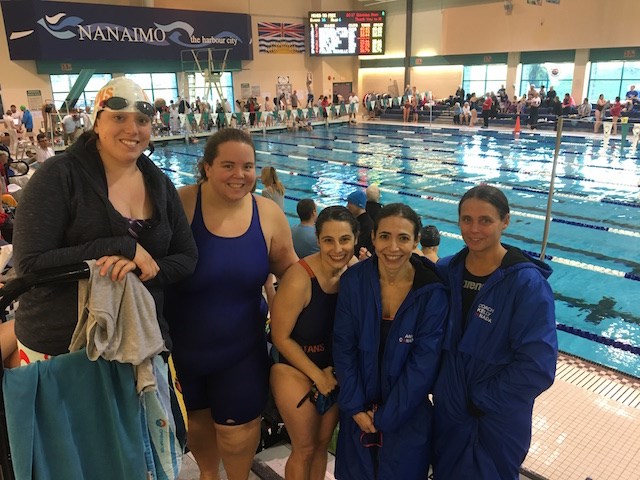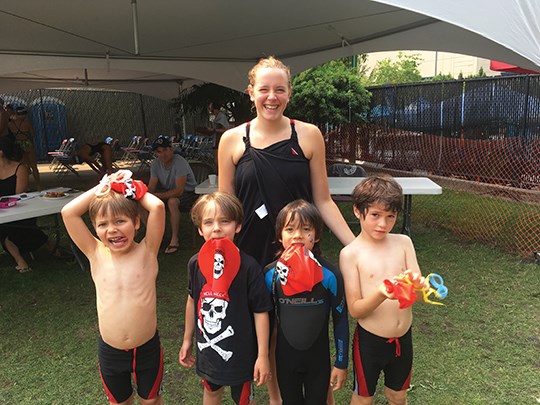Kelly Kaye remembers getting eye-to-eye with a beginner swimmer who was panicking at the thought of her head under water for more than two seconds. Her physiotherapist recommended swim training to help with a serious neck injury from a car accident.
This summer, that same swimmer finished her first meet with the Squamish Titans — cutting across a lake for a two-kilometre swim in front of 1,000 people.
“That’s life-changing,” explains Kaye. “And that’s what it’s all about for me.”
Kaye coaches the Squamish Titans, an endurance multisport club, and is the head coach for the Pirates, the local children’s swim club. Previously, she spent years coaching top national champions in North Vancouver.
The two clubs go hand-in-hand, Kaye says, since the Pirates train two hours a week in the fall season while Squamish Titans use the winter months to improve their swimming technique as a triathlon training club.
Kaye says swimming is not an independent sport. “I’ve always said the fifth member of a relay team is the whole team,” she explains, noting adults take longer to trust but tend to have more body awareness than children.
She started racing herself this year and is “pretty close to breaking provincial records” with hopes of bringing home the Masters Swimming Association of British Columbia banner for small teams. Last year, they placed third overall with a league trophy.
Katie Coombs calls Kaye a “goddess” and can’t remember a life without swimming. The 30-year-old started competitively swimming in Squamish five years ago and has been racing for the last three years. Kaye coaches her and calls Coombs “a talented technical swimmer.”
When she’s not swimming with Squamish Titans, Coombs coaches the Pirates.
“Kelly has that special way with anyone, whether it’s a kid or adult,” says Coombs, who says she uses the skills she learned with Kaye in her own coaching.
“It’s really neat to watch kids chip away at their goals,” she says. “The most important part is to have fun and always swim from the heart.”
Coombs tells them not to worry about disqualification, having experienced it herself at the 2016 provincials in the first race of the day.
“I swam and didn’t control my breathing and wasn’t mentally prepared,” she explains. “I barely made it.”
Coombs finished, dizzy and seeing stars. When she tried to exit the pool, she felt a sharp pain in her foot while using the ladder. At the same time, they announced she was disqualified because her arms did not clear the water enough for the butterfly stroke.
“A person who was 75 years-old swam faster than me,” says Coombs, who ended up with a broken ankle and out of the water for months. After her surgery, swim parents brought hot meals and checked in on her.
“The community is one huge family and we’re all there for each other,” says Coombs, who keeps a wall in her home full of drawings and pictures from the kids. “It makes me want to keep going.”
This November, Coombs entered the provincials again — racing in the same pool, same lane.
“I would not let this race determine who I am,” she says. “I nailed it.”
Roseline Grimm is the head coach of Squamish Titans. She coaches with Kaye, rotating two or three times a week.
With 44 members, the team’s swimmers range in age from late teens to late sixties.
Like Kaye, Grimm is determined to bring home the first place banner this season.
“At all the meets we’ve done, we’re ranking first,” she says. There have been three meets with another three scheduled during the winter and provincial championships in April.
They’ve had ex-Olympians and Grimm says it’s rewarding to work with hardcore athletes. “It’s the one sport you can do till 97 years old,” she says. “You just adapt the stroke and keep going.”
It’s the same focus and social inclusion that keeps the kids going, says Tamara Guerin, the president of The Pirates.
“The program that Kelly has created helped these kids with self-confidence and their team building abilities,” she says. “They’re all compassionate and check in with their friends after a hard race.”
Her children, 11 and eight years old respectively both wanted to join swimming and she says Kaye creates a team atmosphere by setting goals.
“She has amazing expectations for them and they all seem to live it,” says Guerin, noting 192 swimmers are registered and competition season runs from May to October. Numbers have spiked over the years.
Guerin’s daughter Alyssa placed sixth at this year’s provincials in the 100-metre freestyle, the youngest member of her division.
Alyssa wasn’t sure she would do very well leading up to the race because her times were slower than the others. But with the help of her coaches Coombs and Kaye, she rose to the challenge.
“I was really proud of myself when I started to get faster,” Alyssa says.
During winter maintenance, she is learning more technique with the goal of making it to finals at regionals.
Guerin says Kaye helps grow confidence in both failure and success. “Swimming is the great equalizer,” she explains. “Kids learn how to cope no matter what.”





